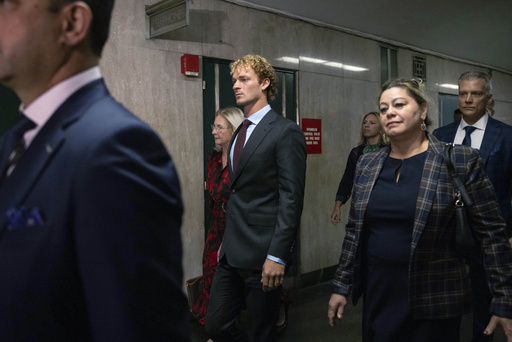
Jurors commenced the process of sharing their backgrounds and any potential biases on Friday as the trial began for a white U.S. Marine Corps veteran accused of killing a troubled Black man in a subway incident last year.
After several days of pre-screening to identify those unable to serve due to work or family commitments, this next phase aims to select Manhattan residents who will deliberate in the manslaughter case against Daniel Penny, who is 25 years old.
Prosecutors state that Penny put Jordan Neely in a chokehold that, according to medical examiners, led to his death. They argue that Penny’s actions were reckless and unwarranted, while his defense attorneys contend that he was attempting to subdue Neely, who was behaving erratically and making remarks perceived as threatening by witnesses.
On Friday, Judge Maxwell Wiley began posing standard questions to potential jurors, including inquiries about their neighborhoods and professions. Additionally, he asked if they or anyone close to them had military experience, martial arts training, or had faced issues related to drug addiction or homelessness. Jurors were also questioned about their subway usage frequency and any previous experiences with disruptive incidents on public transit.
The case has risen to prominence, encapsulating intense discussions regarding public safety, mental health, the distinction between intervening and vigilantism, and racial dimensions that influence perceptions of such events.
Protests in support of Neely have taken place, contrasting with demonstrations defending Penny. Several notable Democratic figures attended Neely’s funeral, while influential Republican politicians labeled Penny a hero for intervening to protect others. In light of the incident, Penny’s legal defense fund has accumulated millions of dollars in contributions.
Jordan Neely, who was 30, had previously gained attention on the subway for his impersonations of Michael Jackson. However, his relatives have disclosed that he faced mental health challenges following his mother’s tragic death, discovered within a suitcase in 2007, leading to his testimony in her boyfriend’s murder trial years later.
Over time, Neely encountered homelessness and struggled with drug abuse, disruptive behavior, and legal troubles, including a guilty plea for assaulting a stranger in 2021.
On May 1, 2023, witnesses reported that Neely entered a subway and began to act chaotically and yell.
Some passengers later communicated to police, captured on body camera footage, that they felt afraid due to his erratic movements and declarations expressing a willingness to die or face incarceration. In contrast, at least one passenger characterized Neely’s conduct as typical for a typical day in New York City, according to a prosecutorial filing.
Penny claimed that Neely shouted, “I’m going to kill everybody,” as documented in police video shown in court. Penny explained that he perceived Neely as a legitimate threat, which prompted him to approach from behind and place his arm around Neely’s neck.
Assisted by two other riders who pinned Neely down, the Marine maintained the chokehold for over three minutes until Neely became unresponsive.
“I put him out,” Penny stated to the attending officer. He later clarified to detectives that his intention was to “de-escalate” the situation rather than to harm Neely.
Medical examiners concluded that Neely’s death resulted from neck compression.
Neely’s family and supporters believe he was merely seeking help rather than threatening anyone.
Donte Mills, an attorney representing Neely’s father, encapsulated the situation by saying, “Someone got on the train and was screaming, and someone choked that person to death.” He emphasized that there is no justification for such actions, stating, “Those things will never balance out.”
Penny’s legal team has indicated their strategy will be to assert that he did not apply excessive pressure that could have caused Neely’s death and that other factors, including the consumption of synthetic cannabinoids like K2, may have played a role.
When the initial group of potential jurors arrived for pre-screening on Monday, almost all acknowledged familiarity with the case.
Judge Wiley reassured them that having formed an opinion does not disqualify them from serving, but he insisted that jurors must remain open to the possibility of their views changing based on the evidence presented.
The duration of the jury selection process remains uncertain, with juror identities kept confidential throughout the proceedings.
